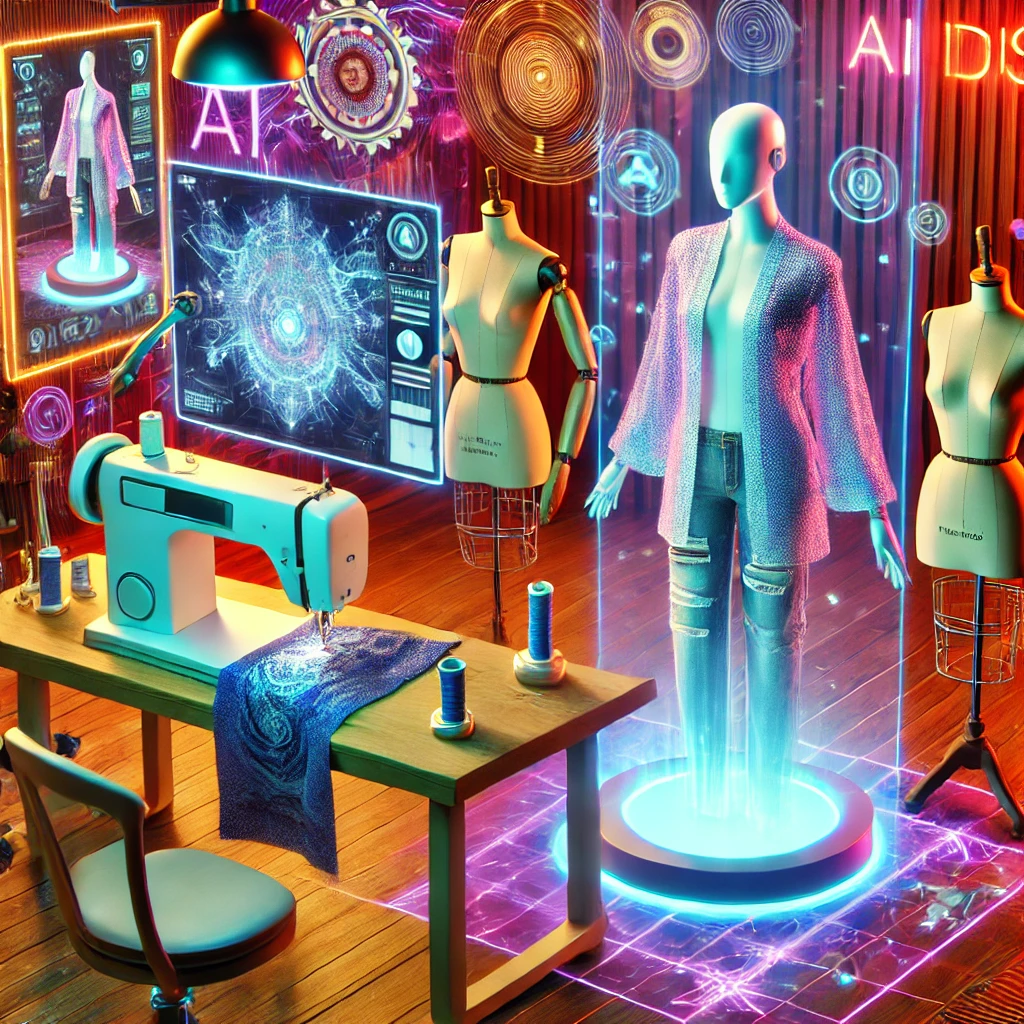Introduction
The fashion industry has always been a dynamic and ever-evolving space, but the integration of artificial intelligence (AI) has taken it to an entirely new level. From streamlining design processes to offering personalized shopping experiences, AI is reshaping how fashion is created, marketed, and consumed. In this article, we will explore how AI is revolutionizing clothing design and personalization, making fashion smarter, more sustainable, and highly customized.

The Role of AI in Fashion Design
Traditionally, fashion design has been a human-driven process requiring creativity, artistic skills, and an understanding of trends. However, AI is now playing a pivotal role in assisting designers by offering data-driven insights and automating various aspects of the design process.
1. Trend Prediction
One of the most significant contributions of AI to fashion design is its ability to predict trends accurately. By analyzing vast amounts of social media posts, runway shows, and consumer behavior data, AI can identify upcoming trends and suggest designs that align with customer preferences. Brands like H&M and Zara use AI-powered trend analysis to create designs that match current fashion demands.
2. AI-Assisted Design
AI-powered tools, such as Deep Neural Networks and Generative Adversarial Networks (GANs), can generate innovative designs based on existing patterns and styles. For example, IBM’s AI system, Watson, has collaborated with designers to create unique collections by analyzing fashion archives and suggesting fresh designs.
3. Virtual Prototyping
Gone are the days when designers had to rely solely on physical samples to visualize their ideas. AI-driven software like CLO 3D and Browzwear allows designers to create virtual prototypes, reducing material waste and speeding up the design process. This digital approach is both cost-effective and sustainable.
AI in Personalization: Creating a Unique Shopping Experience
Consumers today crave personalized fashion experiences. AI is making it possible to tailor recommendations, suggest outfit ideas, and even customize garments based on individual preferences.
1. AI-Powered Recommendation Engines
Online retailers such as Amazon and ASOS leverage AI-driven recommendation engines to provide personalized shopping suggestions. These systems analyze past purchases, browsing behavior, and fashion preferences to offer products that align with a customer’s taste.
2. Virtual Try-On and Fitting Rooms
With AI and augmented reality (AR), customers can now try on clothes virtually before making a purchase. Brands like Nike and Gucci use AR-powered apps that allow shoppers to see how clothing and accessories look on them, reducing return rates and enhancing customer satisfaction.
3. AI-Based Customization
Companies like Unspun and Stitch Fix use AI to create made-to-measure clothing. Customers input their measurements and preferences, and AI generates garments that fit perfectly. This level of customization ensures a unique fashion experience while reducing waste from unsold inventory.
AI and Sustainability in Fashion
Sustainability is a major concern in the fashion industry, and AI is helping brands adopt eco-friendly practices by minimizing waste, optimizing supply chains, and promoting ethical fashion.
1. Reducing Fabric Waste
AI-driven design software optimizes fabric usage by creating patterns that minimize excess material. This approach reduces textile waste and makes fashion production more sustainable.
2. Smart Supply Chain Management
AI enhances supply chain efficiency by predicting demand, reducing overproduction, and optimizing logistics. For instance, AI-powered demand forecasting helps brands manufacture the right amount of clothing, minimizing unsold stock and waste.
3. Ethical Sourcing and Transparency
AI helps brands track the origins of their materials, ensuring ethical sourcing and compliance with sustainability standards. Blockchain-powered AI systems provide transparency in the supply chain, allowing customers to verify the sustainability of their purchases.
The Future of AI-Designed Fashion
The integration of AI in fashion is still in its early stages, but the future holds even more exciting possibilities:
- AI-Generated Fashion Lines: Designers may collaborate with AI to create entire clothing collections based on emerging trends and customer insights.
- Smart Fabrics: AI-driven textiles that adapt to environmental conditions, such as temperature-sensitive clothing, could become mainstream.
- AI in Retail: Virtual fashion assistants powered by AI could provide style advice, helping shoppers curate outfits tailored to their preferences.
- Enhanced Personalization: Advanced AI algorithms will further refine personalization, allowing for hyper-customized fashion experiences.
Conclusion
Artificial intelligence is revolutionizing the fashion industry, from trend prediction and AI-assisted design to personalized shopping experiences and sustainability initiatives. As technology continues to evolve, AI-driven fashion will become more innovative, sustainable, and customer-centric. Whether you’re a designer, retailer, or fashion enthusiast, embracing AI in fashion is the key to staying ahead in this ever-changing industry.
With AI leading the way, the future of fashion looks smarter, more creative, and incredibly exciting.
Courtesy: Internet
Related Articles:
Artificial Intelligence in Fashion Design Explained
Developing an AI-based automated fashion design system: reflecting the work process of fashion designers
The Future of Fashion: Emerging Trends Shaping the Industry









+ There are no comments
Add yours